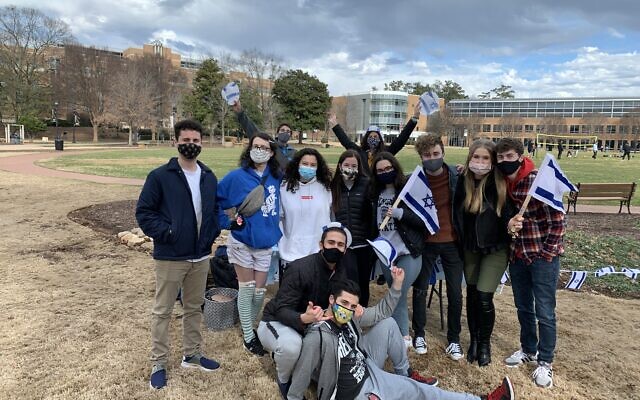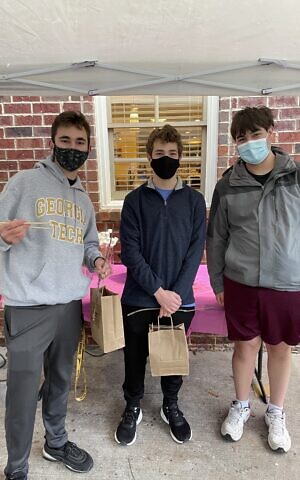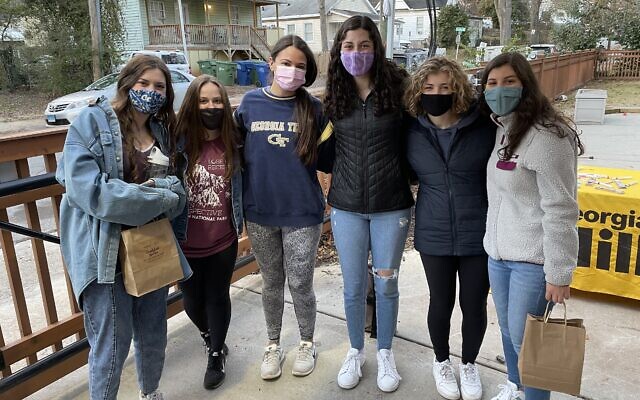Pre-Vaccine, Students Head Back to Campus
College-age students aren’t eligible yet to receive the COVID vaccine, but many campuses are increasing in-person teaching following feedback from the fall semester.
A rising sophomore at Georgetown University, Nathan plans to major in government and minor in film and media studies as well as statistics, hoping to eventually get into a career creating digital content for campaigns or covering them for the Atlanta Jewish Times and other media outlets.

As students prepare to return to their colleges across Georgia, both in-person and online, students face a variety of situations, depending on each school.
While there aren’t universal policies for the Georgia university system, many colleges are taking similar approaches to their fall 2020 semesters, as college-age students haven’t been eligible yet to receive the vaccine.
Some of the universities are adopting mixed classes in which a few classes are in-person – with online options – as well as fully online courses.
Students arriving back on campus for the spring semester will also be facing an upsurge in COVID-19 cases among their peers, as there’s been an uptick in COVID cases since a relative low level at the beginning of October.
At least 164 new coronavirus deaths and 8,924 new cases were reported in Georgia on Jan. 14, according to The New York Times. Over the past week, there has been an average of 9,587 cases per day, an increase of 45 percent from the average two weeks earlier, the newspaper reported.

The University of Georgia consistently had over 100 cases a week since Nov. 30 according to the University Health Center and about 4,700 positive tests during the fall semester through Jan. 8. Even with the COVID pandemic at its worst as the spring semester begins, UGA plans to increase the number of classes offered in person.
Among the students the AJT interviewed, some were excited to return to campus, while others are not sure their school is totally prepared for possible COVID outbreaks on campus.
Although being back on campus will be a better educational experience, a few students said they were concerned about the health risk. “I haven’t been going out all that much so I’m not too worried about being exposed,” said sophomore Jacob Rogow. “I am kind of upset most classes will likely be online again as it makes the learning process that much more difficult.”
Several schools in Georgia have gone above and beyond to protect their students.
Mercer University has seen some success stopping COVID’s spread while hosting in- person classes. All students are required to have testing before coming back to campus for in-person classes, as well as face coverings required for all classrooms, laboratories and common spaces.
While some schools may struggle to get test results back in a timely manner, Mercer has created an on-campus laboratory to ensure testing capabilities are maintained. Mercer has a “Bears Care” initiative meant to keep both students and faculty safe as they resume in-person classes.
Bradley Rudy, a freshman, said of the pandemic, “It is somewhat of a letdown to have my first-year college experience affected so heavily by COVID-19.” Still, he is confident in his school’s response and felt “rather calm” returning to campus. “The level of care and detail they put into keeping everything sanitary and safe has let me be able to feel somewhat at ease with the fear of COVID.”
At Kennesaw State University, many of the safety requirements are the responsibility of students. KSU is asking students to self-monitor temperatures and hand sanitizing, as well as requiring them to wear masks and socially distance. They are also using a notification system to inform students if they come in contact with someone in class that tested positive for COVID, dependent on the infected student informing the school of those details.
Datiel Dayani, a sophomore at KSU studying biology, is pleased with how the school is responding to COVID. “I feel fine going back amidst COVID; they seem to be taking proper protocol and everything.” One of the major reasons colleges have been returning to in-person classes has been to enable students to get the in-person experiences they need for their degrees.
“As a STEM major, it’s important to have my labs in person because I need those essential skills,” Dayani said.

Georgia Tech has taken a similar approach this semester to last. Tech has decided to reinforce in-person classes following feedback from last semester that showed, “students feeling at times isolated and missing a more engaged academic experience.” Tech said it “can safely increase on-campus presence and instruction, to include regular, prescheduled in-person meetings in hybrid courses.”
Cody Kaplan, a Tech freshman, is feeling “very excited about going back. I feel my school does a great job with their restrictions to keep us safe.”
Ruthie Stolovitz, a sophomore, said she is “pretty happy with how the school is reacting right now. Their testing is incredible, really fast, easy, and free.” Stolovitz said “some students are doing their part, and many are not, but I think the school had a good handle on it as of the end of fall semester.”
Georgia State University, like most Georgia colleges, has continued to offer both in person and online classes amid the pandemic. “The majority of courses are offered in a ‘blended’ format, a mix of face-to-face and online instruction.”
GSU freshman Talya Gartner said, “I feel going back to schools with the existing COVID situation is not a smart idea and is only going to make the outbreak worse.” Still, she added, “I feel like my school has prepared. …. There is really only online classes, but I am aware that some classes do have an in-person option. I think this is a great idea, despite the fact that I do not like the idea of learning through a computer.”
As with all colleges in the University System of Georgia, students will be required to wear face masks.
Georgia Southern University is increasing the number of classes offered with in-person learning in the upcoming semester. Sophomore Sidnie Gothard said, “Georgia Southern has actually handled the situation well, considering the circumstances, and have made preparations to keep campus as COVID-free as they can without completely shutting down the university. They have split classes into groups and assigned days that you go in so you can stay socially distant during any in-person classes. “

Emory University has created a compressed spring semester to reduce students’ exposure to COVID during breaks, where students may travel off campus. Students are required to complete an “on-boarding” process, which includes a health assessment, contact tracing form, and a COVID-19 test, before being allowed back on campus. Students will also have a “passport” on their phone starting in February that will allow them to have clearance to enter certain buildings. Emory junior Jake Busch said, “All of my classes for the spring are online and there will be limited opportunities for me to be on campus, which I understand also, but wish wasn’t the case ….” For freshmen, “it sounds like they’ve been able to make the most out of their experience at Emory despite the COVID situation.”
Emory has also been pushing a “For You. For Us. For Emory” campaign that emphasizes the responsibilities of community members for the safety of the general community during the pandemic.
While the University System of Georgia generally oversees how public colleges and universities respond to COVID this upcoming spring semester, Gov. Brian Kemp said in a press conference Jan. 8 he believes that schools had enough time to create safe protocols for in-person school. “Students of that age bracket do not meet the qualifications yet [for vaccination] … The data we are seeing in young people in our state is very clear. The kids should be in the classroom.”



comments